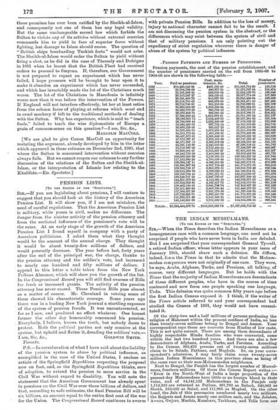PENSION LISTS.
pro TEE EDITOR. OF THE ..SPEOTATOIC1 Sra,-If you are legislating about pensions, I will venture to suggest that you should look at the history of the American Pension List. It will show you, if I am not mistaken, the need of careful regulations. That the American Pension List is military, while yours is civil, makes no difference. The danger from the sinister activity of the pension attorney and from the sectional influence of the pensioner's vote will be the saine. At an early stage of the growth of the American Pension List I found myself in company with a party of American politicians. I asked them what they thought would be the amount of the annual charge. They thought it would be about twenty-five millions of dollars, and would presently decrease. The year before last, forty years after the end of the principal war, the charge, thanks to the pension attorney and. the soldier's vote, had increased to nearly one hundred and fifty millions of dollars. I append to this letter a table taken from the New York Tribune Almanac, which will show you the growth of the list. In the Congressional Record you will still find swarms of Bills for fresh or increased grants. The activity of the pension attorney has never ceased. These Pension Bills pass almost as a matter of course. Mr. Cleveland in vetoing some of them showed his characteristic courage. Some years ago there was in a leading New York journal a startling exposure of the system of pension frauds. It was uncontroverted, so far as I saw, and produced no effect whatever. One honest farmer the other day honourably renounced his pension. . Everybody, I believe, knows the truth, but nobody dares to protest. Both the political parties not only connive at the system, but uphold and flatter it, dreading the soldiers' vote.- P.S.-In corroboration of what I have said about the liability of the pension system to abase by political influence, as exemplified in the case of the United States, I enclose an article of the Springfield Republican respecting the proposal now on foot, and, as the Springfield Republican thinks, sure of adoption, to extend the pension to mere service in the Civil War without regard to disability. You will note the statement that the American Government has already spent in pensions on the Civil War over three billions of dollars, and that, according to safe estimates, the final Pension Bill will be six billions, an amount equal to the entire first cost of the war for the Union. The Congressional Record continues to swarm
with private Pension Bills. In addition to the loss of money, injury to national character cannot fail to be the result. I am not discussing the pension system in the abstract, or the differences which may exist between the system of civil and that of military pensions. I am only pointing out the expediency of strict regulation wherever there is danger of abuse of the system by political influence.






































 Previous page
Previous page